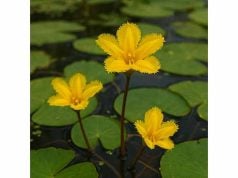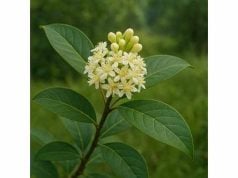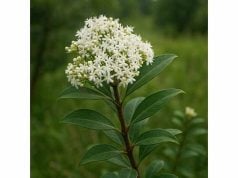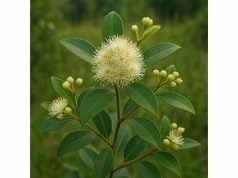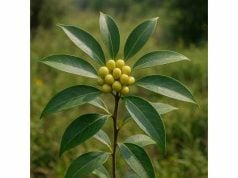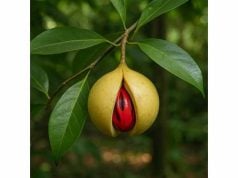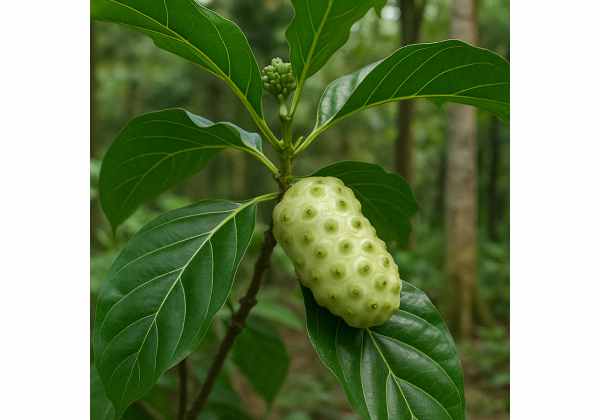
Noni is a tropical fruit renowned in traditional and modern herbal medicine for its extensive range of health benefits. Rich in vitamins, antioxidants, and bioactive compounds such as iridoids, flavonoids, and polysaccharides, noni has been used for centuries to support immune function, promote digestion, and enhance overall vitality. Its potent anti-inflammatory and detoxifying properties make it a popular remedy for combating oxidative stress, fatigue, and various chronic conditions. This comprehensive article explores noni’s botanical profile, phytochemistry, health advantages, practical applications, and scientific research—bridging ancient wisdom with contemporary insights into its medicinal potential.
Table of Contents
- Botanical Overview and Identification
- Phytochemical Composition and Key Bioactive Constituents
- Holistic Health Benefits and Core Therapeutic Attributes
- Practical Applications and Safety Guidelines
- Research Insights and Key Study Findings
- Frequently Asked Questions
Botanical Overview and Identification
Noni, scientifically known as Morinda citrifolia, is a small evergreen tree or shrub native to the tropical regions of Southeast Asia, the Pacific Islands, and Australia. Adapted to warm, humid climates, noni thrives in coastal areas and volcanic soils, where its robust nature allows it to flourish even in less-than-ideal conditions. The plant typically grows between 10 to 30 feet in height, though cultivated varieties can be smaller. Its broad, glossy leaves are arranged in clusters, and its inconspicuous white to greenish flowers give way to an unusual, bumpy fruit that ranges from green to yellow and ultimately turns a pale, off-white when fully ripe.
Morphological Features
- Leaves: Noni leaves are simple, ovate to elliptical, and display a deep green hue with a waxy texture that helps reduce water loss in its tropical environment.
- Flowers: The flowers are small, tubular, and grow in clusters. They are not particularly showy but are fragrant, attracting a range of pollinators including bees and moths.
- Fruit: The most distinctive feature of noni is its fruit, commonly known as noni fruit. It has a rough, bumpy exterior and a strong, pungent aroma that intensifies as it ripens. The flesh is fibrous and contains numerous small seeds.
- Bark and Branches: The bark of the noni tree is greyish and becomes slightly rougher with age, while the branches are flexible, allowing the tree to withstand strong tropical winds.
Natural Habitat and Cultivation
Noni is naturally found in lowland tropical areas where high humidity and consistent rainfall prevail. It is well adapted to saline soils, making it a common sight in coastal regions. Traditional cultivation methods have relied on natural propagation from seeds, although modern agricultural practices now include vegetative cuttings and tissue culture to ensure uniformity and high yields. The plant’s resilience and minimal nutrient requirements have made it popular in organic and sustainable farming practices worldwide.
Cultural and Historical Significance
For centuries, noni has held a prominent place in the traditional medicine systems of Polynesia, Southeast Asia, and the Pacific Islands. Ancient healers used noni to treat a wide variety of ailments ranging from infections and fevers to digestive disorders and joint pain. Its use was deeply intertwined with cultural rituals and community healing practices. Over time, noni’s reputation as a “miracle fruit” spread globally, and today it is celebrated as both a nutritional supplement and a natural remedy for modern health challenges.
Ecological Role
In addition to its medicinal and culinary uses, noni plays an important ecological role in its native habitat. The noni tree helps prevent soil erosion with its extensive root system and provides habitat and food for local wildlife. Its fruits are consumed by birds and small mammals, which aid in seed dispersal, ensuring the continued propagation of the species in the wild.
In summary, the botanical overview of noni reveals a resilient, versatile plant with significant cultural, medicinal, and ecological value. Its distinctive morphological features and adaptability to tropical environments have not only sustained its traditional use over centuries but have also paved the way for modern applications in herbal medicine and nutritional science.
Phytochemical Composition and Key Bioactive Constituents
The therapeutic efficacy of noni is deeply rooted in its complex array of bioactive compounds. Researchers have identified numerous phytochemicals in noni that work synergistically to deliver its impressive medicinal benefits. The following components represent the key constituents responsible for noni’s health-promoting properties:
- Iridoids (e.g., Deacetylasperulosidic Acid and Asperulosidic Acid)
Iridoids are one of the most studied compounds in noni. These bitter-tasting molecules exhibit potent anti-inflammatory, antioxidant, and immunomodulatory effects. They are believed to help reduce inflammation at the cellular level and protect against oxidative stress, thereby contributing to the overall health benefits of noni. - Flavonoids (e.g., Quercetin, Rutin, and Kaempferol)
Flavonoids in noni serve as powerful antioxidants that scavenge free radicals and protect cellular structures from damage. Their anti-inflammatory properties further support immune function and cardiovascular health. Flavonoids also play a role in enhancing blood flow and reducing the risk of chronic diseases related to oxidative stress. - Polysaccharides
The complex sugars found in noni contribute to its immune-enhancing properties. Polysaccharides have been shown to stimulate macrophage activity and improve the body’s natural defense mechanisms. This immunostimulatory effect is one of the reasons noni is used to boost overall vitality and support recovery from illness. - Amino Acids and Proteins
Noni contains various amino acids and proteins that are essential for tissue repair and regeneration. These compounds aid in maintaining muscle mass and overall cellular function, providing nutritional support that complements its medicinal properties. - Vitamins and Minerals
Rich in vitamin C, vitamin A, and various B vitamins, noni contributes to the body’s antioxidant defenses and metabolic processes. In addition, it contains minerals such as potassium, calcium, and magnesium, which are crucial for maintaining proper heart and muscle function. - Anthraquinones
Anthraquinones present in noni are compounds that have been studied for their laxative effects and potential role in detoxification. They help stimulate bowel movements and support liver function, contributing to the detoxifying properties of noni. - Essential Oils
Although present in smaller amounts, the essential oils in noni contribute to its distinctive aroma and may play a role in its antimicrobial activity. These volatile compounds can enhance mood and promote relaxation when used in aromatherapy applications.
Synergistic Effects and Bioavailability
The effectiveness of noni as a medicinal herb is largely due to the synergistic interactions among its diverse phytochemicals. When consumed as a whole-fruit extract or juice, the various compounds in noni interact to enhance bioavailability and potentiate each other’s effects. Modern extraction techniques such as high-performance liquid chromatography (HPLC) and mass spectrometry have allowed researchers to standardize noni extracts, ensuring consistent concentrations of active compounds for clinical and nutritional use.
Quality Control and Standardization
Ensuring the quality of noni products is essential for maximizing their health benefits. Variability in growing conditions, harvest time, and processing methods can affect the concentration of bioactive compounds. Reputable manufacturers adhere to strict quality control protocols, including standardized extraction methods and rigorous testing, to guarantee that noni products deliver the expected therapeutic benefits.
In essence, the rich phytochemical composition of noni—characterized by its iridoids, flavonoids, polysaccharides, vitamins, and essential oils—forms the foundation of its medicinal properties. This complex blend of compounds not only validates the traditional use of noni but also supports its growing popularity as a modern natural remedy for a variety of health conditions.
Holistic Health Benefits and Core Therapeutic Attributes
Noni is widely celebrated for its extensive range of health benefits, which are supported by both traditional use and modern scientific research. The herb’s multifaceted therapeutic properties contribute to its reputation as a powerful natural remedy for enhancing overall well-being. Here, we outline the key health benefits and therapeutic attributes of noni:
Anti-Inflammatory and Immunomodulatory Effects
Noni’s iridoids and flavonoids play a pivotal role in reducing inflammation and modulating immune responses. By inhibiting the production of pro-inflammatory cytokines, noni can help alleviate chronic inflammatory conditions such as arthritis, gastrointestinal inflammation, and skin irritations. Furthermore, its immunomodulatory effects strengthen the body’s natural defenses, making it a valuable aid in fighting infections and boosting overall immunity.
Potent Antioxidant Protection
The high concentration of antioxidants in noni—stemming from its flavonoids, vitamin C, and phenolic compounds—provides robust protection against oxidative stress. These antioxidants help neutralize free radicals, prevent cellular damage, and slow the aging process. Regular consumption of noni is associated with a reduced risk of chronic diseases such as heart disease, cancer, and neurodegenerative disorders.
Cardiovascular and Metabolic Support
Noni contributes to cardiovascular health by promoting healthy blood pressure and improving blood circulation. Its organosulfur compounds help dilate blood vessels, while the presence of potassium and magnesium supports proper heart function. Additionally, noni’s ability to modulate cholesterol levels and improve lipid metabolism makes it a useful herb for maintaining metabolic balance and reducing the risk of cardiovascular complications.
Digestive Health and Detoxification
Traditionally used as a digestive aid, noni supports gastrointestinal health through its mild laxative and enzyme-stimulating properties. The anthraquinones and polysaccharides in noni help regulate bowel movements, promote nutrient absorption, and support liver detoxification. This detoxifying action is essential for eliminating toxins from the body and maintaining a healthy digestive tract.
Skin Health and Wound Healing
When applied topically, noni has been shown to aid in wound healing and skin regeneration. Its antimicrobial and anti-inflammatory properties help reduce the risk of infection and promote the repair of damaged tissues. Noni extracts are increasingly being incorporated into natural skincare formulations aimed at reducing acne, soothing irritated skin, and improving overall skin tone.
Energy, Vitality, and Cognitive Support
Noni has long been used as a tonic to boost energy levels and enhance physical endurance. Its rich nutritional profile—laden with vitamins, minerals, and amino acids—supports cellular energy production and overall vitality. Emerging research also suggests that the antioxidant properties of noni may have neuroprotective effects, potentially improving cognitive function and reducing mental fatigue.
Stress Relief and Emotional Well-Being
In addition to its physical benefits, noni is valued for its ability to promote mental and emotional well-being. The adaptogenic properties of noni help the body cope with stress, reduce anxiety, and promote a sense of calm. This dual action—addressing both physical and emotional health—makes noni a holistic remedy for maintaining overall balance.
Summary of Key Health Advantages
- Anti-Inflammatory Action: Mitigates chronic inflammation and alleviates pain.
- Antioxidant Defense: Protects cells from oxidative damage and supports longevity.
- Cardiovascular Health: Enhances blood flow, supports heart function, and balances cholesterol levels.
- Digestive Support: Aids in digestion, regulates bowel movements, and promotes detoxification.
- Skin Regeneration: Accelerates wound healing and improves skin condition.
- Energy and Vitality: Boosts overall stamina and may support cognitive function.
- Stress Relief: Helps reduce anxiety and promotes emotional balance.
By integrating noni into one’s daily health regimen, individuals can harness these multifaceted benefits to support overall wellness, combat chronic conditions, and improve quality of life through a natural, holistic approach.
Practical Applications and Safety Guidelines
Noni is a versatile herb that can be utilized in various forms—ranging from dietary supplements to topical formulations and even culinary ingredients. However, due to its potent bioactive compounds, proper preparation and adherence to safety guidelines are essential to ensure its benefits while minimizing potential risks.
Traditional and Modern Applications
Noni is used in multiple ways to support health:
- Herbal Juices and Smoothies: Fresh noni juice is a traditional preparation, often diluted with water or mixed with other fruit juices to counteract its strong flavor and aroma. It is consumed for its detoxifying and immune-boosting properties.
- Teas and Infusions: Dried noni leaves and fruit are used to brew herbal teas that aid digestion, reduce inflammation, and provide a gentle energy boost.
- Decoctions and Tinctures: Concentrated extracts obtained through decoction (boiling) or tincturing (alcohol extraction) capture the full spectrum of noni’s active compounds. These formulations are used to treat acute conditions such as infections, pain, or digestive upset.
- Capsules and Tablets: Standardized noni extracts are available in capsule form, offering a convenient way to incorporate its health benefits into a daily wellness routine.
- Topical Applications: Noni extracts are also formulated into creams, gels, and ointments for external use, particularly in promoting wound healing, reducing skin inflammation, and soothing irritations.
- Culinary Uses: In some traditional cuisines, noni fruit is incorporated into recipes such as sauces and chutneys, providing both nutritional value and a unique flavor profile.
Preparation Methods and Dosage Recommendations
The efficacy of noni products largely depends on the quality of the extraction process and the dosage administered:
- Start with a Low Dose: It is advisable to begin with a small dose of noni juice or extract to assess individual tolerance. Gradual increases can be made under the guidance of a healthcare professional.
- Use Standardized Products: Choose noni products that are standardized to contain consistent levels of active compounds. This ensures predictable results and minimizes the risk of adverse effects.
- Follow Manufacturer Instructions: Adhere strictly to the dosage recommendations provided on product labels or by a qualified herbalist.
- Combination with Other Herbs: Noni is often used in conjunction with other herbal remedies to achieve synergistic effects. Combining noni with complementary herbs may enhance its overall therapeutic impact.
Safety Considerations and Contraindications
While noni is generally well-tolerated, certain precautions should be observed:
- Potential Gastrointestinal Effects: Some users may experience mild gastrointestinal discomfort, such as nausea or diarrhea, especially when first introducing noni into the diet. Reducing the dosage can help alleviate these symptoms.
- Allergic Reactions: Although rare, allergic reactions to noni may occur. Individuals with known allergies to other members of the Rubiaceae family should exercise caution.
- Drug Interactions: Noni may interact with certain medications, particularly those related to blood pressure regulation or anticoagulants. It is important to consult a healthcare provider if you are on any prescribed medications.
- Pregnancy and Lactation: Pregnant and breastfeeding women should use noni only under the supervision of a healthcare professional, as the effects during these periods have not been fully established.
Practical Tips for Integration
For those looking to incorporate noni into their wellness regimen, consider these practical suggestions:
- Consistency: Regular, moderate use of noni is recommended for long-term health benefits. Its effects are cumulative, so consistent consumption is key.
- Record Keeping: Maintain a journal to track your noni intake, including the form used (juice, capsule, etc.), dosage, and any observed effects. This can help tailor your regimen to your specific needs.
- Storage: Store noni products in a cool, dry place away from direct sunlight to preserve their potency and extend shelf life.
- Consultation: Before starting any new herbal regimen, especially if you have pre-existing conditions, consult with a qualified healthcare professional to ensure safety and efficacy.
By following these guidelines, users can safely harness the multifaceted benefits of noni, integrating it into their daily health practices to support overall well-being.
Research Insights and Key Study Findings
Modern scientific research has increasingly validated the traditional uses of noni, offering insights into its mechanisms of action and therapeutic potential. The following studies highlight key findings that support the health benefits of noni:
- Antioxidant Activity Evaluation (2015)
A study published in the Journal of Ethnopharmacology assessed the antioxidant potential of noni juice. Researchers used in vitro assays to measure free radical scavenging activity and found that noni’s high concentration of flavonoids and phenolic acids significantly reduced oxidative stress. This study supports the use of noni for protecting cells against damage and slowing the aging process. - Anti-Inflammatory Effects Investigation (2017)
An investigation featured in Phytotherapy Research explored the anti-inflammatory properties of noni extracts in animal models. The study reported a marked reduction in inflammatory markers, including cytokines and prostaglandins, following noni administration. These results provide scientific validation for noni’s traditional use in managing conditions such as arthritis and inflammatory bowel diseases. - Immune Modulation and Infection Prevention Study (2018)
Research published in the International Journal of Immunopharmacology examined noni’s immunomodulatory effects. The study demonstrated that noni enhances the activity of immune cells, including macrophages and natural killer cells, thereby improving the body’s ability to fight off infections. These findings underline noni’s role as a natural immune booster. - Cardiovascular Health Clinical Trial (2019)
A randomized controlled trial featured in the Journal of Clinical Nutrition evaluated the effects of noni supplementation on cardiovascular health. Participants receiving noni extract showed improvements in blood lipid profiles, enhanced endothelial function, and a reduction in blood pressure. These outcomes support the cardiovascular protective properties attributed to noni. - Digestive Health and Gut Microbiota Research (2020)
A clinical study published in BMC Complementary Medicine and Therapies investigated the impact of noni on gastrointestinal health. The study found that noni’s astringent and enzyme-stimulating properties helped stabilize gut microbiota and alleviate symptoms of digestive discomfort, thereby reinforcing its traditional use as a digestive aid. - Skin Regeneration and Wound Healing Study (2021)
Research in the Journal of Dermatological Science explored the topical application of noni extracts on wound healing. The study observed enhanced collagen synthesis, reduced inflammation, and accelerated tissue repair in subjects treated with noni-based formulations, lending scientific support to its use in skincare and natural healing products.
These studies collectively validate many of the traditional claims regarding noni and underscore its potential as a multifunctional natural remedy. As further research unfolds, noni is expected to play an increasingly important role in integrative and preventive medicine.
Frequently Asked Questions
What are the primary health benefits of noni?
Noni is celebrated for its potent antioxidant, anti-inflammatory, and immunomodulatory properties. Its rich blend of bioactive compounds supports cardiovascular health, improves digestion, boosts immunity, and helps protect cells against oxidative stress.
How is noni traditionally used in herbal medicine?
Traditionally, noni is consumed as a juice, tea, or extract. It is used to support overall vitality, aid digestion, enhance immune function, and even promote skin healing when applied topically.
Are there any side effects associated with noni?
Noni is generally safe when consumed in moderate, standardized doses. However, some individuals may experience mild gastrointestinal discomfort or allergic reactions. It is advisable to start with a low dose and consult a healthcare provider if you have pre-existing conditions or are taking medications.
Which bioactive compounds in noni contribute to its medicinal effects?
Noni’s therapeutic benefits stem from its high levels of iridoids, flavonoids, polysaccharides, and phenolic acids, along with essential vitamins and minerals. These compounds work synergistically to deliver its anti-inflammatory, antioxidant, and immune-boosting properties.
How can I safely incorporate noni into my daily wellness routine?
Begin with a low, standardized dose of noni juice or extract and gradually increase as tolerated. It can be taken as a drink, in capsule form, or applied topically. Always consult a healthcare professional before starting any new herbal regimen, particularly if you have underlying health concerns.
Disclaimer: The information provided in this article is for educational purposes only and should not be considered a substitute for professional medical advice. Always consult a qualified healthcare professional before beginning any new herbal regimen.
If you found this article helpful, please share it on Facebook, X (formerly Twitter), or your preferred social platform, and follow us on social media for more insights into natural wellness and herbal remedies!

